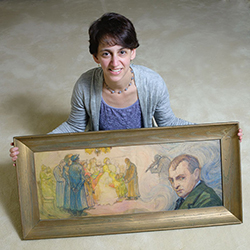-
Chapter 9, Unmoored: The Betty L
This post is about several things. It’s about Parenting an ADHDer. It’s about the life of a writer. It’s about the mantra from Austin Kleon to, show your work. As Kleon writes, “…it’s important to get things in front of other and see how they react.” It is, I confess, a little bit scary to share this. I recorded it a few weeks ago (thank you IMRSV Sound) and I’ve been sitting on it because, well, there are risks to sharing something so personal – you might not like it, you might judge my parenting, my writing, you might think my audio isn’t up to snuff, and you might have opinions about oh so many other things. I’ve been in turmoil for the last few days… post it, don’t post it. There are an equal number of reasons for me to share it and to not share it. But, in the end, living a creative life is about about believing in yourself and taking risks in the hope that a piece of this resonates with you. You can listen (transcript here) to Chapter Nine, Unmoored: The Betty L, here. Scroll down a bit to see the photograph mentioned in the chapter:
About the Project
Shipwrecks defined my father’s career; his long absences to remote salvage jobs shaped my childhood and, ultimately, our relationship. Now in my 50s, I dig through the records of my father’s work in the South China Sea, the Brooklyn Navy Yard, Cape Cod, and San Francisco Bay, to better understand his work and forge a closer bond with him. In the process, I find surprising insights into

my relationship with Owen, my teenage son struggling with ADHD. Offering an unflinching account of my role as a daughter, wife, and mother, I expose my blind spots and share my hard-won insights. Salvaged shows the journey to intergenerational love, understanding, and acceptance through the unique lens of maritime disaster and recovery. Read more about the project here.
-
ADHD Tax
There’s this idea/concept/phrase, ADHD Tax, that a lot of ADHDers use to reference the extra effort, resources, and time they must put into everything they do. The idea is that this extra effort is taxing on them. Usually it’s an emotional toll, but it can be a monetary one as well.
For example….The other day my son planned to visit a favorite game store to play a board game with friends. He would walk from our home in Oakland to the BART station (a 30 minute walk), take the train to a second station, change trains, get off in Berkeley, and walk several blocks to the store. It was hot and he had a lot to carry, so I offered to drive him to the second station saving him time and the trouble of having to change trains.
Generous and kind of me, right?
But something about that change of plans threw him off his plan and instead of catching the train to Berkeley, he took the train back to the station in our neighborhood.
FACE PALM.
In the end, I drove him to the game store. Even so, he was late, and the stress of being late, messing up, and feeling stupid…. that was the ADHD tax. And the tax to me? My time and $$ for gas.
I laughed about the whole thing and he tried to laugh about it because there was nothing to be gained about being mad about the situation.
Read more here: ADDitude Magazine on the ADHD Tax
-
Parenting Exhaustion
My younger son is 19, but still likes me to help him with things. The other day I spoke to someone on his behalf. I said to the woman, “well, he has ADHD so that might make it more complicated for him,” and she was quiet and I said, “does that have any particular meaning for you?” She paused and said she’d worked with another young woman who has ADHD, but then nothing more was said. The need to explain my son to others has always felt awkward, but somehow always felt necessary. Like…maybe… if they understood the way things **might** flare up, they’d be better prepared to help him through it. That didn’t always turn out to be the case. I remember one summer that he went to sleepaway camp and less than 12 hours after he’d arrived, we got a call to come collect him. Why? He’d had a particularly visceral emotional reaction to another camper and the staff found it concerning. My reaction? That’s the ADHD. But even if you understand the ADHD, it can be hard to explain to others. Parenting an ADHDer can be emotionally exhausting. Be kind to yourself.
-
Bullying
Did you know that kids with ADHD may be targeted more often than their peers for bullying? But, you’re asking, how could their peers be picking on them for their ADHD? It’s not exactly the ADHD itself, but the behaviors ADHDers tend to exhibit that are relatively easy to target. Things like being clumsy and walking into things more often (did you even know ADHDers sometimes struggle with spatial matters?), struggling academically, violating others’ boundaries, and sometimes impulsively saying inappropriate things.
My son once experienced social media bullying when a classmate misinterpreted a comment he’d made about the song I Don’t Like Mondays by Boomtown Rats. The classmate was convinced it meant our kiddo was bringing a gun to school and planning something devastating. The student should have talked to a teacher about it, but instead posted about it on SnapChat and it spread like wildfire until a parent got hold of it, notified the administration, and I got a frantic phone call. My son’s comment was probably inappropriate, but he didn’t deserve to be so publicly raked across the coals for what was a total misunderstanding of his original comment.
Read more on bullying and ADHD here: https://www.drakeinstitute.com/add-and-bullying

Elizabeth Rynecki is an author and documentary filmmaker. Her first book, Chasing Portraits: A Great-Granddaughter’s Quest for Her Lost Art Legacy was published by NAL/Penguin Random House in 2016. Her documentary of the same name is distributed by First Run Features in New York. This blog shares her experiences about parenting her son who has ADHD.
Elizabeth has a BA in Rhetoric from Bates College (’91) and an MA in Rhetoric and Communication from UC Davis (’94). She lives in Oakland with her husband, two sons, and three black cats.